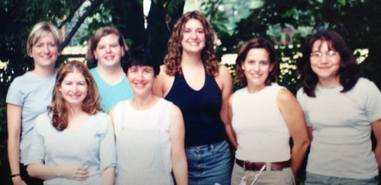A week later, at an event for first year honors students, one of my colleagues introduced herself to me, assuming I was a… first year honors student.
Before age 40, I always looked young. I have always been short (no improvement post-40). As a child and teenager everyone assumed I was much younger than my age. In grad school everyone assumed I was an undergrad. I was carded well into my 30’s, and occasionally after 40 in really poor lighting.
The experiences didn’t stop at my first couple of weeks as assistant professor. They continued, both in my teaching and research life. At conferences when I presented, people would ask me “Who do you work with?”
As an instructor, I had difficulty getting students to treat me with respect. Students would call me “Eva” and call male assistant professor colleagues “Professor X.” I would receive very informal emails. Students would sometimes interrupt my lectures to make jokes (some of which were inappropriate). I also would get comments in my student evaluations that made it clear students perceived me as young. The one I will never forget: “She expected us to call her Dr., and that’s ridiculous. Dr. is a title you earn, you don’t just get to be called it.” Somehow my 6 years in a doctoral program were wiped away by a student who thought I was too young to be a Dr.
I was (mostly) able to turn it around, especially on the teaching front. Here are some of the things I did, some of which overlap with the advice in the post I linked to above:
- I stopped putting my first name on the syllabus. Viewing it here, it seems bratty, but it worked when I wrote the following on my syllabus:
Professor: Dr. E. Lefkowitz
Pronunciation: DOK-ter LEF-coe-wits
- I also wrote it on the board the first day, and made a couple of jokes about how not to pronounce it (not Lef-cow-ski; not Lewinsky [it was a long time ago]). Students got the point. Now that I’m older, I don’t care if students call me Eva. But when I was in my early 30’s it mattered, and it felt as though the use of Eva was part of a pattern rather than a word choice.
- I started signing my emails “Dr. L.” I didn’t mind being called Dr. L if they had trouble pronouncing my last name.
- More generally, I made it very clear in the syllabus what my expectations were for student behavior in the classroom.
- I wore my glasses on teaching days. And usually pulled my hair back into a rather severe ponytail. These two things, while perhaps not exactly aging me, did give me a more librarian look, which helped.
- I also started wearing rather conservative suits or slacks and sweaters on teaching days. I was careful not to wear anything tight, short, or basically, very fashionable. I always wore heels, usually giving myself a minimum of 2 inches.
- I dressed similarly for conferences, always trying to look very professional and relatively conservative. If I had a poster, I added “Ph.D.” to my name. If I gave a talk, I did the same in my slides. I made sure in my presentations to thank my students and colleagues at the start. And if someone I met at a conference asked me whom I worked with, I would say, “I work with a number of graduate students in our program – do you know some of them?”
I’m sure there are other things I did, but it’s been almost a decade since I felt like it was really an issue, so I don’t remember everything I did.
With time (and wrinkles), my work self has evolved closer to “me” and less of a persona of “female professor.” Students can call me by my first name if they choose. I’m a bit more relaxed and casual in the classroom. I have moved away from the librarian look, rarely wear my glasses or my hair back, and wear the clothes I want, though I almost never wear jeans or casual clothing to the office.
Would it be better if we lived in a world where we didn’t have to think about these things? Sure. But was my teaching and professional life easier after I made these changes? Absolutely.
“The post Strategies for young looking academics first appeared on Eva Lefkowitz’s blog on August 6, 2014.”



 RSS Feed
RSS Feed
